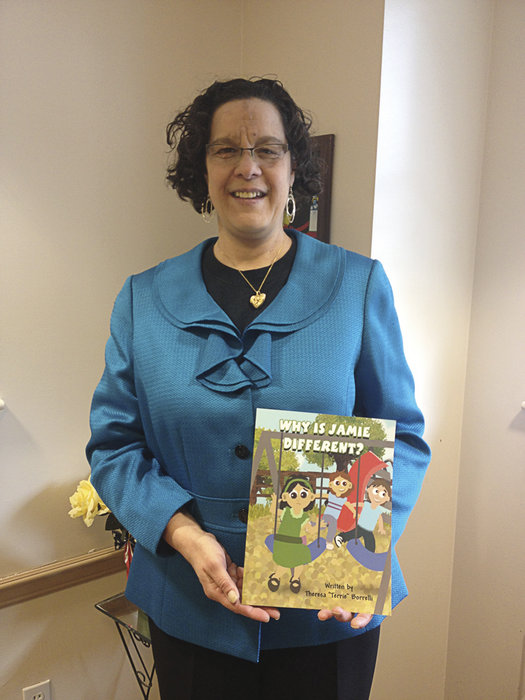Weehawken resident Theresa Borrelli’s new book, “Why is Jamie Different?” isn’t exactly autobiographical, but it is certainly relatable to the author’s own childhood, as well as the childhoods of thousands of young people around the world living with Tourette Syndrome. Borelli, who has suffered from the disease since she was 8, said that growing up different from other children inspired her to write the book, which chronicles the struggles of Jamie, who has the syndrome, as she tries to make friends despite her verbal tics. (With Tourette Syndrome, tics can include blinking, fidgeting, and in extreme cases, uncontrollable outbursts.)
“I hope this book shows children not to bully someone who’s different, for whatever reason,” she said in an interview. “Show support for someone different; be kind to them.”
“Why is Jamie Different,” is Borrelli’s second book. In 2011, she published a memoir entitled “I Am Myself: A Woman Growing Up With Tourette Syndrome,” which focused on the author’s struggles as an adult. Still, she felt that children could benefit from a book as well, as children who have a classmate suffering from Tourette’s often are unaware how to act.
“Show support for someone different, be kind to them.” – Theresa Borrelli
____________
Borrelli explained that students with Tourette’s often become class clowns, whether intentionally or accidentally, as a way to be accepted. In the end, this hurts them more, Borrelli said.
“If students could learn to accept students with Tourette’s they wouldn’t have to be class clowns,” she said. “There’s no reason for students to be bullied to the point where they develop behavioral problems.”
Growing up ‘different’
“I don’t like to use the word ‘normal’ when talking about kids who don’t have Tourette’s,” said Borrelli. “It’s not an issue of normal or abnormal, it’s just an issue of difference.”
This, she said, is the moral of Jamie’s story. She struggles throughout the book to make friends because of her tics, the most common symptom of Tourette’s.
The story culminates when Jamie’s one friend, Tasha, encourages her to speak to the class about her tics so that they understand that she is not crazy; just different.
“‘I cannot help the things I do with my body and throat,’ ” Jamie tells her classmates. “‘It’s like when you have a scratch in your throat and you have to cough.’ ”
Borrelli explained that she was incredibly private about her Tourette’s growing up, and never dreamed of speaking about it publicly until a college friend encouraged her to speak to her Psychology 101 lecture class about it.
“I used to go into the bathroom and cry when I was bullied,” said Borrelli, “and all of a sudden in college I’m standing in front of 100 people talking about my tics.”
Borrelli had never taken medication for her Tourette’s before college, but started after speaking to her class. She said that once she disciplined herself to focus, she was able to control her tics and be more productive.
She also learned to accept her Tourette’s, something she says is the most important thing any child suffering from a disease can do to help themselves.
“Tourette’s is a disorder but it doesn’t hold you back,” she said. “It’s just a chemical in your brain. It doesn’t affect your learning or your ability.”
Acceptance, she said, is the first step towards learning to live with the disorder.
“If you accept your Tourette’s, and you learn about the negatives and positives of it, then you can learn to control it,” she said.
A life worth living
Borrelli said that when she was 13, she wrote a list of things she wanted to accomplish by the time she turned 50. At age 49, she has accomplished nearly all of them. Writing a children’s book was one of the things on the list.
“Even with Tourette’s, you’re capable of just about anything you set your mind to,” she said.
Since graduating from school, Borrelli has owned her own business, worked as a parole officer for the New Jersey Department of Corrections, worked as a guidance counselor, and been a teacher and professor from the kindergarten level all the way to college.
It’s all about perspective, she said.
“I’ve had people cross the street when I’m walking toward them, because they think I have a drug or alcohol problem,” she said. “I still always act nice and always have a smile on my face.”
She said that when she acts as a motivational speaker, she encouraged her audiences to embrace difference.
“If we were all the same, the world wouldn’t spin the way it does,” she said.
Both “Why is Jamie Different?” and “I Am Myself: A Woman Growing Up With Tourette Syndrome” are available on amazon.com and barnesandnoble.com. For more information on Theresa, visit her website at theresaborrelli.com or email her at tb49borrelli@gmail.com.
Dean DeChiaro may be reached at deand@hudsonreporter.com
